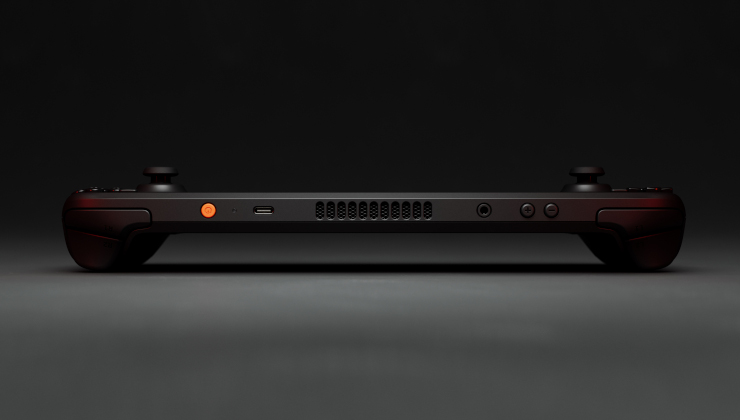Here's something that could be exciting but also could be a whole lot of nothing. So keep expectations firmly in check, but work submitted for Linux kernel 6.6 show something interesting from Valve. Potentially a Steam Deck refresh or their new VR headset perhaps?
The note comes from Phoronix, who as usual goes over basically every little thing Linux kernel related. They found work being pulled in for Linux kernel 6.6 sound updates, that includes additions for AMD Van Gogh, the chip used in the Steam Deck. However, when you look into the full updates and scroll down for a while there's this interesting little bit:
So here we have Galileo and Sephiroth being added for Valve - the question is what are they? They're being added under "Valve Jupiter device", with Jupiter being one of the names Valve seems to use for SteamOS. Considering the current SoC in the Steam Deck is named Aerith, a refresh of Sephiroth would continue their fun Final Fantasy inspired naming.
They could point to a lot of things: a Steam Deck refresh, the new VR headset we know they're working on, some developer boards they use in-house or anything really. We really have no idea but it's always fun to wonder about what it could turn out to be.
For SteamDeck product_family is Aerith and product_name is Jupiter, so for me this patch means Steamdeck 2 confirmed! Codename Galileo with a new SoC called Sephiroth! Now the only question: What is the timeline and where are we currently on it? xD
What I would want is a version of the Steam Deck without the screen, a Steam Brick if you will. I think that could be really popular both for desk and couch gaming. Sure you can get a dock a get almost the same experience but not entirely.Make one yourself. There are quite a few dinky NUC-like machines available, or you can just plug any computer into a TV or monitor. Install Linux on it, autolaunch Steam Big Picture, and pair it with a PlayStation controller. Job jobbed.
I could and I have done so in the past but I don't want to anymore. I work in IT and when I get home I just want stuff to work with minimal setup, with support from a stable company/organization so everything doesn't break after 6 months. That's why I love SteamOS with EmuDeck. That to me is an acceptable level of setup :)
I always feel like they are going to bring back the Original Steam Machines, but instead of it failing by relying on native ports, now they can use Steam OS on it.Oh yes, the time might be ready for that.
They said there would be a fix in the Kernel for 3.5.0 and people are still complaining about how bad the audio is on the dock in 3.4
Steam Deck is a bit short on beef once you're looking at a larger screen with more resolution.I always feel like they are going to bring back the Original Steam Machines, but instead of it failing by relying on native ports, now they can use Steam OS on it. That would be a very interesting project and I believe it would greatly contribute to Linux gaming. Just like Steam Deck has up until now.
Would love to see what kind of impact a home console from steam would bring not only to the PC gaming market, but also to the Linux gaming space!
I don't see the point of steam machines when SteamDeck covers the market through hooking up to the TV
It's unlikely the small form factor of a steam machine will include better hardware.That strikes me as likely to be inaccurate. All hypothetical, but look--the Deck is intended for playing games on its small screen, and it has the hardware capable of doing that.
Nobody's going to launch a machine intended for playing games on large screens which is not capable of playing games on large screens.
It's unlikely the small form factor of a steam machine will include better hardware. If you want a beefy console to game at the TV - install arch with the steam-minicompositor so that only steam launches at bootup and then you can play games as if its a console.
I'd consider a machine ten times the size (height) of the Steam Deck still "small form factor". This should be able to contain beefier hardware quite well.
Which ones?It's unlikely the small form factor of a steam machine will include better hardware.That strikes me as likely to be inaccurate. All hypothetical, but look--the Deck is intended for playing games on its small screen, and it has the hardware capable of doing that.
Nobody's going to launch a machine intended for playing games on large screens which is not capable of playing games on large screens.
Compare the size of the old steam machines.
Which ones?It's unlikely the small form factor of a steam machine will include better hardware.That strikes me as likely to be inaccurate. All hypothetical, but look--the Deck is intended for playing games on its small screen, and it has the hardware capable of doing that.
Nobody's going to launch a machine intended for playing games on large screens which is not capable of playing games on large screens.
Compare the size of the old steam machines.
The most visible ones like the Alienware Alpha and Zotac's NEN were pretty tiny, but they were powerful enough to run any game from 2014 at a decent resolution. They sported something like Nvidia's GTX 860 / 960 and a mid tier Intel core CPU, which is close to what I had in my own full size computer at that time. Still, they were a lot larger than a handheld like the Deck.
Don't know how relevant that is though. Other brands sold--or at least advertised--larger and more powerful Steam Machines.
Spoiler, click me
Don't know if it has any importance, but found it interresting.
Edit: Bruce... What the... Bryant!
Last edited by Mohandevir on 8 Sep 2023 at 9:37 pm UTC
What I would want is a version of the Steam Deck without the screen, a Steam Brick if you will. I think that could be really popular both for desk and couch gaming. Sure you can get a dock a get almost the same experience but not entirely.Make one yourself. There are quite a few dinky NUC-like machines available, or you can just plug any computer into a TV or monitor. Install Linux on it, autolaunch Steam Big Picture, and pair it with a PlayStation controller. Job jobbed.
I could and I have done so in the past but I don't want to anymore. I work in IT and when I get home I just want stuff to work with minimal setup, with support from a stable company/organization so everything doesn't break after 6 months. That's why I love SteamOS with EmuDeck. That to me is an acceptable level of setup :)
I feel like setting up a Windows PC and installing Steam on it is not that much work. Especially Steam has long since had the ability to launch on startup of the PC into Big Picture Mode (which now has a Deck-like interface). I know this is a Linux-focused website but if your main issue is compatibility/stability, that's your best bet.
What I would want is a version of the Steam Deck without the screen, a Steam Brick if you will. I think that could be really popular both for desk and couch gaming. Sure you can get a dock a get almost the same experience but not entirely.Make one yourself. There are quite a few dinky NUC-like machines available, or you can just plug any computer into a TV or monitor. Install Linux on it, autolaunch Steam Big Picture, and pair it with a PlayStation controller. Job jobbed.
I could and I have done so in the past but I don't want to anymore. I work in IT and when I get home I just want stuff to work with minimal setup, with support from a stable company/organization so everything doesn't break after 6 months. That's why I love SteamOS with EmuDeck. That to me is an acceptable level of setup :)
I feel like setting up a Windows PC and installing Steam on it is not that much work. Especially Steam has long since had the ability to launch on startup of the PC into Big Picture Mode (which now has a Deck-like interface). I know this is a Linux-focused website but if your main issue is compatibility/stability, that's your best bet.
I get the point, though. Holoiso and ChimeraOS are great, but they often have to catch up with new bugs. This is what happens when you try to support all the pc configurations available. If Valve was selling an official Steam Machine with a fixed hardware, it would be easier for them to support, maintain a bug free experience and all that with an agressive pricing. I've said it before and the Steam Deck is a good example of that: Linux shines in the dedicated hardware market.
Edit: Just imagine a Steam Machine priced like a Rog Ally or Lenovo Legion Go, but much more powerfull... Mhmmm... Could be a jab at these "power cord required handhelds". It would add the option to play AAA games via In-home Streaming, when possible, with a 6hrs+ battery autonomy, even on the 400$ Steam Deck with better performances than these other handhelds. I like that too.
Last edited by Mohandevir on 8 Sep 2023 at 5:39 pm UTC
I know it's unlikely, but I'm still hoping for a new Steam Controller...
If it has a headphone jack, it could need an audio driver, right?
(At this point I pretty much convinced myself that it isn't a gamepad.)
The driver is for the OS, which runs the game. For a gamepad, the sound is coming from a device that runs the game.
Also makes no sense to run a Linux OS on a gamepad if it's only a gamepad.
I know it's unlikely, but I'm still hoping for a new Steam Controller...
If it has a headphone jack, it could need an audio driver, right?
(At this point I pretty much convinced myself that it isn't a gamepad.)
The driver is for the OS, which runs the game. For a gamepad, the sound is coming from a device that runs the game.
Also makes no sense to run a Linux OS on a gamepad if it's only a gamepad.
I'm not sure I understand what you mean...
The gamepad would be connected as a peripheral device to the computer that runs the game. If the gamepad contains an audio-chip, that chip would need a driver on the computer the gamepad is connected to.
(And yes, I am aware that there is a standard for USB audio devices - but if I've learned one thing over the years, than that hardware manufacturers treat standards as suggestions at best.)













 How to set, change and reset your SteamOS / Steam Deck desktop sudo password
How to set, change and reset your SteamOS / Steam Deck desktop sudo password How to set up Decky Loader on Steam Deck / SteamOS for easy plugins
How to set up Decky Loader on Steam Deck / SteamOS for easy plugins
See more from me